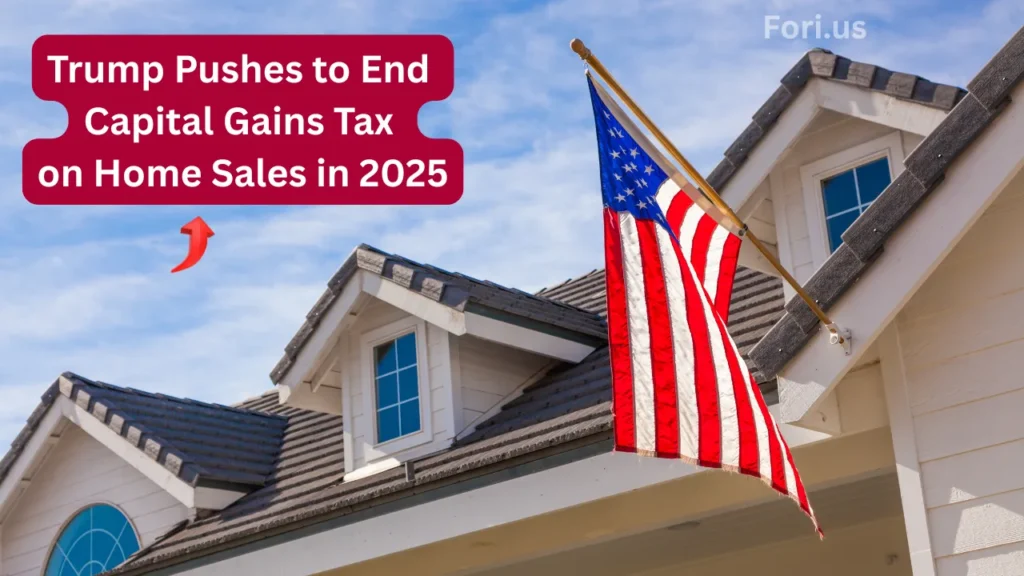Trump’s 2025 Plan-Ending Capital Gains Tax on Home Sales- In 2025, former President Donald Trump announced his support for a new plan that could change the way Americans sell their homes. The plan, known as the No Tax on Home Sales Act, seeks to wipe out federal capital gains taxes on earnings made from selling a primary home.
If approved, homeowners would no longer have to worry about paying federal taxes on the money they make from selling their homes. This move is gaining attention nationwide as rising home prices push more people above outdated tax thresholds.
Pebble Beach Door County-A Peaceful Shoreline Escape
Trump’s 2025 Plan-End Capital Gains Tax on Home Sales in 2025
| Topic | Current Law | Proposed Change |
|---|---|---|
| Exclusion for Single Filers | $250,000 | No limit |
| Exclusion for Joint Filers | $500,000 | No limit |
| Residency Requirement | 2 of last 5 years | None |
| Tax on Excess Gains | 15–20% | 0% |
| Inflation Adjustment | None | Not needed |

Current Capital Gains Rules on Home Sales
Right now, the tax system allows some profits from home sales to go untaxed, but there are limits.
- Single homeowners can exclude up to $250,000 in gains.
- Married couples filing jointly can exclude up to $500,000.
- To qualify, the homeowner must have lived in the house for at least two of the past five years.
If profits go beyond these limits, the extra amount is taxed at federal capital gains rates, which range between 15% and 20%, depending on income.
Social Security Changes 2026-Higher Age, Bigger COLA, New Taxes
What Trump’s 2025 Plan Proposal Would Change
The No Tax on Home Sales Act would remove these restrictions.
- No profit limits: All gains would be tax-free.
- No residency requirement: Homeowners would not need to live in the property for two years.
- No capital gains tax: Sellers would keep all profits from their main home.
If approved, it would mark a major change from the current system, which has operated under the same rules since 1997 an era when housing prices and market trends were much lower than today.
Why the Change Is Being Considered
Housing prices across the U.S. have risen sharply in recent decades. According to the National Association of REALTORS® (NAR), as of 2025:
- About 34% of individual homeowners exceed the $250,000 limit.
- Nearly 10% of married couples exceed the $500,000 limit.
- More than 29 million homes are affected by the individual cap.
This shows that many families are paying taxes because the thresholds haven’t been updated to match today’s housing market, where home values have doubled or tripled in some regions.
New SNAP Rules 2025-More States Ban Processed Foods
Who Would Benefit the Most
Those who stand to benefit the most from this plan include:
- Long-term homeowners in high-cost states like California, New York, and Massachusetts, where property values have soared.
- Seniors and retirees who want to downsize but fear large tax bills from selling long-held properties.
- Military families and job-related movers, since the two-year residency rule would no longer apply.
Example Scenarios
- A single homeowner with a $350,000 gain would currently owe $20,000 in taxes but would pay $0 under the new law.
- A married couple with a $600,000 gain would currently owe $20,000 but would also pay $0 if the law passes.
Support and Criticism of the Plan
Backers of the proposal argue that it could
- Encourage more homeowners to sell, increasing housing supply.
- Allow retirees to relocate without heavy tax penalties.
- Simplify the tax code by removing complicated rules.
Critics warn about possible downsides:
- Critics warn that the federal government might face revenue losses worth billions of dollars. Even indexing the current limits to inflation would already cost around $18.7 billion over 10 years.
- Some investors might try to cheat by claiming vacation or rental homes as primary residences.
- Eliminating the tax may fuel even higher demand in already expensive housing markets, worsening affordability problems.
Top Stimulus Scams 2025-Fake Checks, AI Frauds, and Texts
What Happens Next in Congress
The bill is still in its early stages, but it is attracting attention from both lawmakers and the public. Some members of Congress may push for smaller reforms, such as adjusting the tax-free limits for inflation instead of fully eliminating the tax.
The debate will likely center around three issues:
- The impact on federal revenue.
- The effect on the housing market.
- The fairness of removing taxes for high-income homeowners.
Whether the proposal passes or not, the discussion highlights growing pressure to modernize tax laws that haven’t changed in nearly three decades.
FAQs About Trump’s 2025 Plan
It is a federal tax on profits made when selling a primary home, with current exemptions of $250,000 (single) and $500,000 (married).
It would completely remove capital gains taxes on profits from selling a primary residence.
Retirees, long-term homeowners in expensive states, and people who move frequently for jobs or military service.
Because housing prices have soared, and millions of homeowners are paying taxes that the original 1997 law did not anticipate.
The bill is still under debate in Congress, and discussions will continue through 2025.
Trump’s push to end capital gains tax on home sales in 2025 has sparked major debate. For homeowners, it could mean keeping thousands of extra dollars when selling. For the government, it raises concerns about revenue loss and market stability. As Congress weighs the options, one thing is clear America’s housing tax rules are overdue for change.
